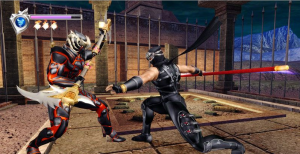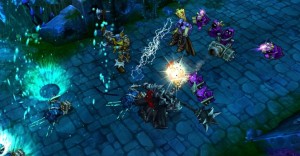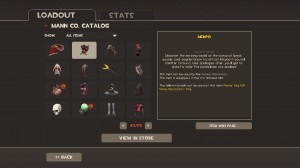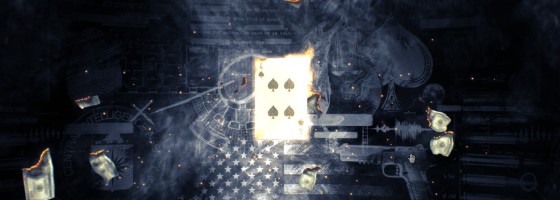I’ve been struggling to keep my enthusiasm up while playing Hearthstone, but each time I stopped playing it was not out of being tired but not wanting to play anymore. Hearthstone is just about dead to me in the same way that Card Hunter was and both suffer from one of the biggest things a designer has to worry about: Keeping someone interested in playing.
Making Progress:
An important element of any video game made is progression and it can be divided into player and game. Player progression refers to the player’s skill level improving and learning how the game works. Such as learning the right combos and special moves to use in a fighting game.
Game progression refers to momentum earned via in game abstraction: Leveling up a character, unlocking a new skill, beating level one and going to level two and so on. What’s interesting about the two is that you can’t really track player progression on its own, but it can be measured through game progression.
Obviously someone who is really good at the game will be able to beat more levels and earn more achievements compared to someone who isn’t. Both forms of progression have the same goal: To prevent the player from feeling like their time is being wasted.
I’ve yet to meet anyone who loves to have their time being wasted and even more so when playing a video game. This is what made early video games very challenging and frustrating as there were no save functions or even passwords. You run out of lives and all the progress you made playing was gone and the slate was wiped clean.

Action titles are all about player progression which can make them very rewarding or very frustrating if you hit a wall.
From experience I can tell you that one of the most frustrating things is repeating the same exact content after already mastering it.
This is why the concept of game saving was such a godsend towards making games accessible and why unorthodox save systems are frowned upon or criticized more.
Another part of wasting time is the ever unpopular state of getting stuck in a game. Going back to the concepts of progression, this could mean either the player has reached the point where they can’t learn anymore or the player has reached a wall in terms of content and can’t move forward.
There is a positive aspect of this and it is when a player masters a game and has seen everything there is and moves on. Mastering a game usually leaves the player content at the fact that they’ve seen everything they wanted and they can go on to another game without having any loose threads left. However, when the game itself puts up the wall forcing the player to feel frustrated and stop playing, then the player leaves with a negative experience.
Avoiding the Brick Wall:
Motivating someone to keep playing a video game can be tough, especially if they are having trouble or are stuck at a certain part. And just like how there are two forms of progression, momentum can be gained via two methods.
Player progression momentum is mainly seen in skill based titles like Dark Souls, Mario, fighting games and so on. Even though the player dies or messes up, they’re learning through their failure what was the correct action and get better in the process.

What’s great about League of Legends is that win or lose, you’re still making momentum towards unlocking something new.
I’ve spoken multiple times about how important the player’s skill is at winning a game like Dark Souls.
If you can’t figure out the enemy attack patterns and when to attack, you’re never going to win period. The problem with player progression momentum is that it is finite, eventually the player will reach the point where they can’t learn anymore and either will get through that wall, or be defeated by it.
That’s where game progression momentum comes in and it’s about using the systems and abstracted mechanics to push the player on. Playing a traditional JRPG, if a boss is too tough for you, you can always grind out levels to overtake them stat wise. So even though the player is not learning anything new, they are still making progress through experience and leveling up. The player knows that every fight they win, no matter how hard or easy that they will gain experience and move ever closer to their goal.
The important point with game momentum is that the player should never, ever, ever feel like they’re going backwards. If losing a match only gives the player 300 experience as opposed to 100,000, that’s still better than seeing them lose experience. When playing a highly competitive game like League of Legends, win or lose you’ll still earn IP for every match that can be used towards something down the line.
This is what originally killed World of Tanks for me under its original monetization model. There were plenty of times where after playing a match, I walked away with negative money and resources. Or in other words, I was better off not playing.
Valve was smart with Team Fortress 2 and simply separated the progression of earning new content from how you play. Instead you’ll earn items just for simply playing the game so that the player is constantly being motivated to keep playing for the promise of new stuff.
My current game addiction would be Payday 2 and the developers made it so that even if you lose a heist, you’ll still earn a drop of experience from it. Again, the player is always making progress and having momentum. The amount of it is less important than the fact that the player is still moving forward.
Fold:
With that said let’s go back to Card Hunter and Hearthstone and where my problem is. I’ve spoken about Card Hunter’s difficulty curve in the past and how for many people, they hit a wall around the early teens. My problem was that the modules I could win weren’t giving me any experience or items I could use. While the modules that were killing me left me walking away with nothing.
Skill wise I topped out at knowing the mechanics and systems, but without new equipment and cards, I couldn’t beat the modules that were preventing me from getting to the next item shop.
With Hearthstone, I’m running into the same problem. Skill wise, I know how the game works and how all the heroes function. But my problem is that my game momentum has come to a complete stop.

Team Fortress 2 complete divorces item progression from playing and lets the game stand on its own, with the items icing on the gameplay cake.
I don’t have enough gold to do an arena or buy new decks. I can’t seem to win any matches which is the only way to get more gold from quests and I’m stuck.
You only receive ten gold for every three matches you win against a real player and the rest comes from completing quests. But that leaves me with a lot of dead time where I’m losing and nothing is getting done. Contrast to Payday 2 where even if I lost five heists in a row, I’m still walking away with some experience that will add up.
At this point the prospect of spending more time playing Hearthstone hoping to get lucky or giving money to get more cards/arcane dust, I can compare it to me asking to be punched in the face.
My suggestion would be to change how gold is rewarded and say that losing a match gains you one gold, winning one match gets you five and winning three in a row provides the ten gold reward on top of any quests that you do. That one gold for losing may sound insignificant but remember that any forward momentum is good, no matter how big or small.
Anytime someone walks away with the feeling that they just wasted time and it would have been better to not play your game, you have a serious problem with your progression model. While player progression is finite, given the right mechanics and systems you can build a very compelling game progression model to keep people coming back for more.
But when that momentum of progression is either lost or going backwards, your game can feel like hitting your head against a brick wall and hoping that this time the wall will crack a little.


